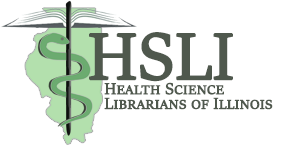Laurel Darling is a student at the University of Illinois at Urbana-Champaign’s School of Information Sciences.
Rushed. Under-caffeinated. A tad nervous. That’s what I was feeling as I was getting ready the morning of the 2023 HSLI Conference, no matter how much I attempted to quell my emotions. As a second-year MSLIS student, this was my second library conference experience (the first being the 2023 ALA Conference), and I was not quite sure what to expect. I drove the two-hour trek to Warrenville with fellow MSLIS student Precious Olalere, during which we speculated about the Conference over caffeinated beverages.
Upon arrival, my nerves dissipated almost immediately. The theme of the Conference was “Stepping Out of the Pandemic: Improvement and Strength”, an apt topic given that this was the first in-person HSLI conference since 2019. As a graduate student, I received warm and friendly welcomes from everyone I approached and questions about my academic and professional interests. To help ease my transition as a first-time student attendee, Sarah Isaacs paired students with a career professional and conference veteran. I was matched with Michelle Nielsen Ott, who provided invaluable job-hunting advice to me as a student entering the market.
Following the opening remarks, we kicked off the morning with four informative lightning talks on an array of topics: Laura Killingsworth on “Preparing for ‘The Big Weed’ of Milner Library’s Physical Nursing Collection”; Ramune K. Kubilius on “Local outreach: Planning institutional opportunities to enhance and engage a traveling exhibit”; Mary Beth Riedner on “Can People Living with Dementia Still Read?”; and Betsey Sterner and Alissa Droog on “Developing a systematic review workshop for graduate students”.
Dr. Tracy Smith delivered the interactive keynote presentation, “Health Scientists, Libraries and Public Health: Partners for Community Health”, on how librarians can promote public-health information and initiatives through collaborative partnerships with community members. As someone interested in bridging academic institutions and resources to local-area communities, I found this session helpful on ways I could build relationships with community-health professionals.
In the afternoon, I attended “Developing an Evidence Synthesis Service: Determining Scope and Needs”, led by Tina Griffin. In this engaging workshop, participants reflected on evidence synthesis in their own institutions and shared ideas in a small group while completing an action-plan packet. I had the opportunity to ask several questions about systematic reviews to the health-science professionals at my table. I came away with a greater understanding of the librarian’s role in these reviews, and I bring this knowledge to scientific review projects I am currently working on and to conversations with my supervisors and colleagues.
I left the Conference feeling invigorated, and I imagined ways in which I could apply the skills and knowledge I learned to current and future librarian positions that I might hold. I wholeheartedly encourage anyone interested in or working in health sciences, no matter how remotely, to attend the HSLI Conference. To fellow students, whether you are interested in health-science librarianship or in attending a professional conference, this is the place for you, and volunteering is well worth the registration waiver and travel.
A tremendous thank you to the presenters, the members of the planning committee for organizing the event, to Sarah Isaacs for leading us student volunteers, and to Eric Edwards for his role as HSLI President and for allowing me to write this reflection.
